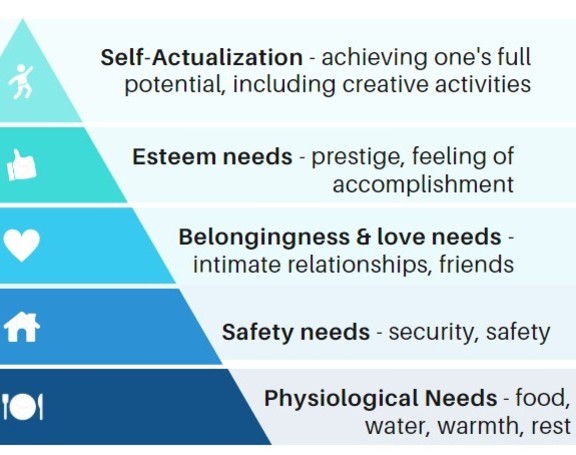Maslow's Pyramid of Needs and Your Chances of Success
Posted on 4th January 2024 at 13:47
Analysis paralysis is a common phenomenon where people cannot make decisions due to excessive analysis and fear of making the wrong choice. This can lead to indecision, stress, and missed opportunities.
Anxiety is a common experience that many people face at some point in their lives. It is a feeling of unease, such as worry or fear, that can range from mild to severe. When anxiety becomes chronic or interferes with daily life, it can be diagnosed as an anxiety disorder. Taking decisions can be particularly difficult for individuals who suffer from anxiety because anxiety can impair their thinking and decision-making abilities. In this essay, we will examine why it is difficult to take decisions when you are anxious.
Anxiety and decision making
Distorted perspective on the situation
An individual who is anxious may see things in a more negative light, causing them to overlook the positive aspects of a situation. This can lead to an overly pessimistic outlook, making it difficult to see the potential benefits of making a certain decision. For example, an anxious person may focus on the risks associated with a new job opportunity and ignore the potential rewards, such as higher pay or a better work environment.
Indecisiveness
When someone is anxious, they may feel overwhelmed by the choices they have to make. This can cause them to become paralyzed and unable to make any decision at all. This indecision can be further compounded by the fear of making the wrong choice and facing negative consequences. This can lead to a vicious cycle where anxiety makes it difficult to make decisions, and the lack of decision-making exacerbates the anxiety.
Overthinking the decision-making process
An individual who is anxious may spend excessive time analyzing the different options, which can lead to procrastination and further delay in making a decision. Overthinking can also lead to information overload, as the individual may become overwhelmed by the amount of information they need to consider. This can cause them to become even more anxious and indecisive, making it even more challenging to make a decision.
Difficulty focusing
When someone is anxious, they may find it difficult to concentrate, which can make it challenging to process information and make decisions. The constant worry and racing thoughts associated with anxiety can make it difficult to focus on the task at hand, causing an individual to miss important information or overlook critical details
It is important for individuals who suffer from anxiety to seek support from friends, family, or mental health professionals to help them manage their anxiety and make decisions more effectively. By taking steps to reduce anxiety and address these challenges, individuals can regain their confidence and ability to make decisions, improving their quality of life.
Here are some strategies to overcome analysis paralysis and make better decisions
Define your decision criteria: Start by identifying the most critical factors to consider. This will help you focus your analysis and avoid getting bogged down in irrelevant details.
Set a deadline: Analysis paralysis often occurs when there is no pressure to make a decision. Set a deadline for yourself to help you stay focused and motivated.
Gather information: Do your research, gather data, and seek input from experts and trusted advisors. However, be mindful of not over-analyzing and using too much information.
Make a list of pros and cons: Write down each option's benefits and drawbacks. This can help you weigh the options and see the trade-offs.


Seek advice: Talk to someone you trust who has experience in similar situations. They may have insights that can help you make a more informed decision.
Test assumptions: Challenge your beliefs and consider alternative viewpoints. This can help you see the situation from a different perspective and avoid making an emotional decision.
Trust your instincts: Sometimes, the best decision is the one that feels right. Trust your instincts, and don't be afraid to make a decision based on gut feeling.
Consider the worst-case scenario: Imagine the worst possible outcome of each option. This can help you see and weigh the risks against the potential benefits.
Make a decision and take action: Once you have analyze the options, make a decision and take action. Remember that no decision is perfect, and you can always make changes later.
Reflect on the decision: After making a decision, take time to reflect on it and learn from the experience. This can help you make better decisions in the future.
How can I make things easier?
Overcoming analysis paralysis requires discipline and focus. By defining your decision criteria, setting a deadline, gathering information, seeking advice, testing assumptions, and trusting your instincts, you can confidently make better decisions. Remember, the key is to avoid over-analyzing and to trust yourself, however sometimes to see a professional can be the breakthrough to real freedom of choice.
Share this post:


